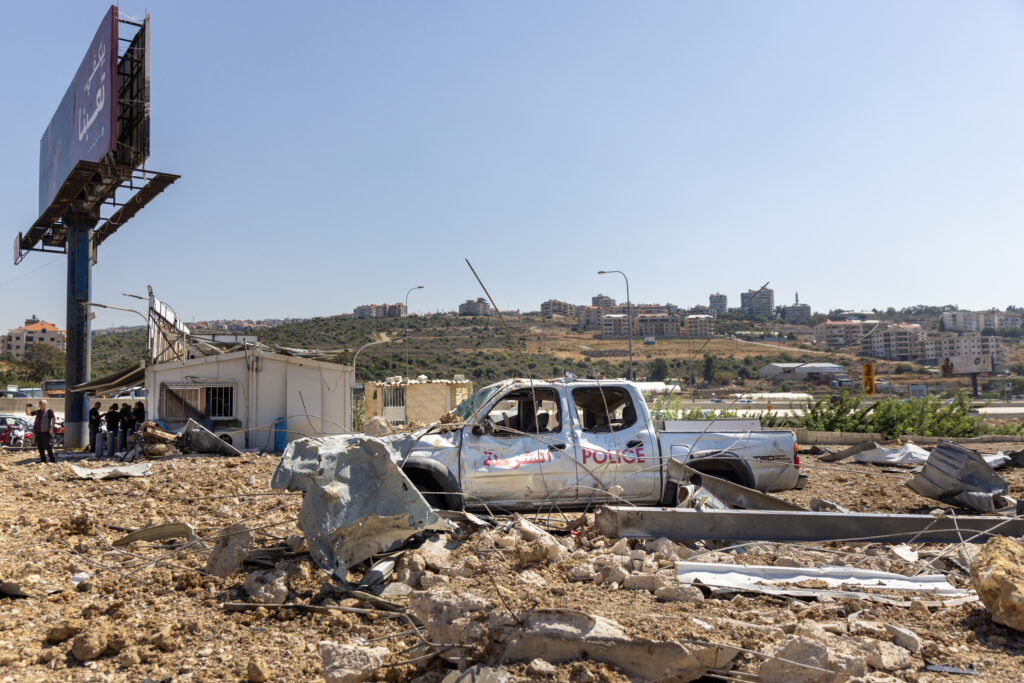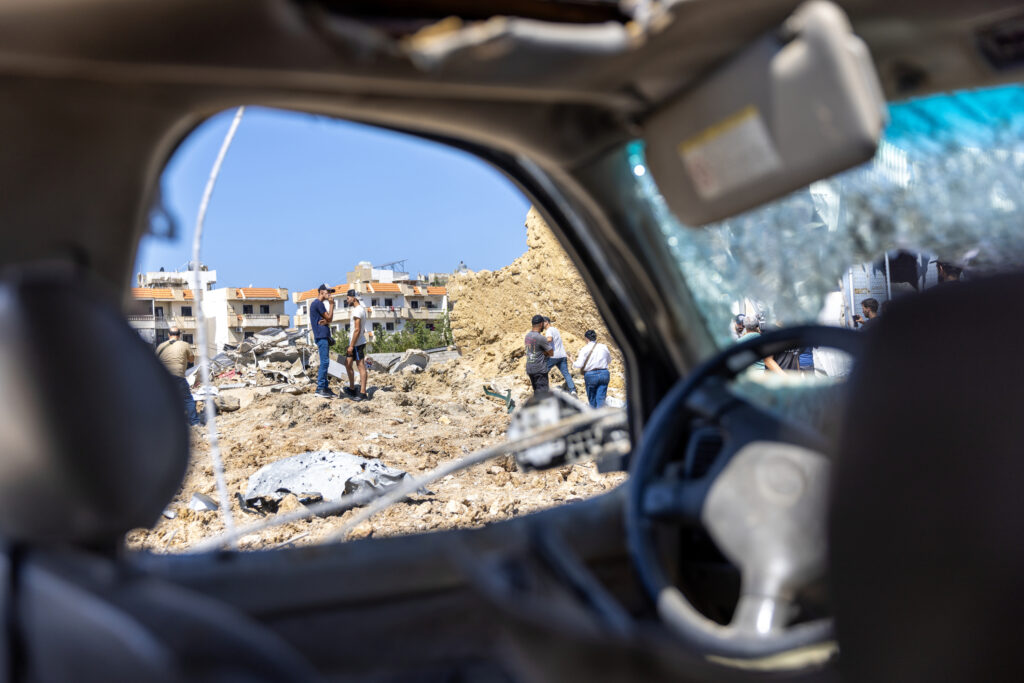Biden and Macron, With Israel on the Brink of Entering Lebanon, Mount Desperate Effort To Block a Widening of the War in the North
The Pentagon seeks to distance itself from possible actions in Lebanon, saying it supplies no intelligence to Israel there.

Updated at 7:59 A.M. E.D.T.
Presidents Biden and Macron, in the face of gains by Israel Defense Forces in Israel’s war with Hezbollah and with the Israel Defense Forces on the brink of entering Lebanon, are pressuring the government in Jerusalem to prevent a widening of the war. Yet Israel, for now, is far from agreeable.
“In recent days, we have worked with our American partners on a temporary ceasefire,” the French foreign minister, Jean-Noel Barrot, told the United Nations Security Council Wednesday night. The proposed three-week pause in the fighting would last 21 days “to allow for negotiations” over a permanent peaceful solution, he said during an emergency session that France initiated to discuss the situation in Lebanon.
Shortly after Prime Minister Netanyahu took off from Ben Gurion airport at 4:00 am Israel time, the White House issued a joint statement with France and a number of world leaders, including two Arab countries, calling on “all parties, including the governments of Israel and Lebanon, to endorse the temporary cease-fire immediately.” The statement omitted any mention of Hezbollah.
If accepted, the proposed three-week pause in fighting would guarantee no war before the November presidential election.
On a plane to New York, Mr. Netanyahu denied a cease-fire agreement has been reached. “The report about a ceasefire is incorrect,” his office wrote on X. “This is an American-French proposal that the Prime Minister has not even responded to.”
Mr. Netanyahu also denied Israeli reports that the IDF is easing up attacks in Lebanon. “The Prime Minister has directed the IDF to continue fighting with full force, according to the plan that was presented to him.”
On Thursday, after Hezbollah fired a rocket salvo at Acre in northern Israel, IDF jets struck several targets in southern Lebanon and the Bekaa valley. Also struck were two roads on the Lebanese-Syrian border, which Iran uses to resupply Hezbollah’s arsenal.
“We are hopeful,” a Department of State official tells the Sun. “We are in contact with our Israeli counterparts, and we also have ways to communicate with the other side.” Hezbollah is part of the Beirut government that America recognizes as legitimate, even as the Iranian-backed group tops the State Department’s terror list.
Prime Minister Netanyahu has reportedly authorized a top adviser, Ron Dermer, to negotiate over the proposal. The premier is scheduled to arrive at New York Thursday morning and address the UN General Assembly on Friday. His trip could present an opportunity to communicate with his American and French counterparts.

“I nearly lost my breath when I heard about this horrible idea,” Sarit Zehavi, the widely regarded founder of Alma, a north Israel based research center, tells the Sun. “This isn’t a cease-fire, it’s an unconditional pause” in Israel’s military assault on Hezbollah.
Unidentified officials in Jerusalem are telling the Israeli press that they are skeptical about the proposal. The IDF chief of staff, Lieutenant General Herzi Halevi, told troops on Wednesday to prepare for a possible entry into southern Lebanon. Israelis say they are open to a diplomatic solution, but only if it ends the Hezbollah threat.
“Absolutely, I would like to see a cease-fire, and the return home of Israelis to their homes in the north, and southern Lebanese to their homes in southern Lebanon,” the Israeli UN ambassador, Danny Danon, told reporters. He added that “you don’t have to reinvent the wheel when you have the medicine in front of you.”
The envoy cited UN Security Council resolution 1701 of 2006, which, he noted, called for the Lebanese national army, along with a UN force, to control a 10 mile-wide area near the Israeli border, and ensure that no armed militias, including Hezbollah, are present there.

The French-American plan reportedly involves a simultaneous cease-fire in Lebanon and Gaza, which could satisfy a demand made by Hezbollah’s chief, Hassan Nasrallah. Hezbollah started bombing Israel on October 8, and its chief says that it would only stop once Israel ends its war against Hamas.
In the last ten days, the IDF and Mossad marked a string of successful pinpoint attacks on Hezbollah’s chain of command and its rocket, missile, and drone arsenal, which is concealed in civilian homes in south Lebanon and the Bekaa valley. Lebanon has reported that more than 300 persons died in the most recent attacks, although it hasn’t specified how many of the casualties were Hezbollah fighters.
On Wednesday morning an Iranian-made missile from Lebanon, which for the first time targeted the Tel Aviv area, was intercepted by Israel’s David’s Sling missile defense system. The new attack was widely seen as a start to a larger war. “Iran will not remain indifferent if there is a full war in Lebanon,” the Islamic Republic’s foreign minister, Abbas Araghchi, told UN reporters Wednesday.
Washington officials make clear that they do not support Israel’s war tactics. “When it comes to Lebanon, the U.S. military has no involvement in Israel’s operations,” a Pentagon spokeswoman, Sabrina Singh, told reporters Wednesday. She said America does not supply any intelligence to the IDF for its current campaign against Hezbollah, adding, “We want to see a diplomatic solution, and we want to see it urgently.”
_________________
Correction: The Lebanese-Syrian border was the location of two roads struck by Israeli fire on Thursday. An earlier version misstated the frontier’s name.

